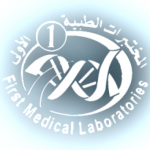Purpose of the circular: we introduced EGFR test by immunohistochemistry. Summary of recent literature about the value of this test with its clinical applications is provided
Introduction: EGFR is a transmembrane protein receptor with tyrosinase kinase activity. Increased level of EGFR are linked with malignant transformation. Estimation of EGFR immunoreactivity by immunostaining detects EGF specific binding sites. Different Carcinomas showed significant staining in variable percentage. Examples of Carcinomas that express EGFR with variable percentage from 30-90%: Non-small cell lung carcinoma, breast carcinoma, endometrial carcinoma , cervical carcinoma and ovarian carcinoma
Clinical applications: Carcinomas that show positive staining for EGFR correlate with poor differentiation of the tumors. These tumors are usually undergoing an aggressive biological behavior and have unfavorable prognosis. There is a positive correlation between the EGF-R binding assay, immunohistochemistry and the relative amounts of mRNA by Northern blotting. Studies demonstrated a significance of EGFR status as an independent prognostic indicator in primary breast cancer with higher risk for relapse. With shorter period of relapse-free survival for EGFR positive patients compared to EGFR negative patients, particularly in node-positive patients. Epidermal growth factor receptor (EGFR) expression is also observed in 50%-70% of colorectal carcinomas and is associated with poor prognosis and poor response for pre-operative radiotherapy. The immunoreactivity of EGFR shows a concordance between the primary lesions and metastatic sites in majority of cases
Treatment of EGFR positive tumors is mainly by two mechanism: Monoclonal antibodies that interfere with receptor signaling (e.g: cetuximab) or by low molecular weight tyrosine kinase (TKI) that interfere with receptor signaling (e.g: gefitinib). This treatment have shown to be effective in many EGFR +ve tumors: for examples, in breast carcinoma that are ER negative/EGFR positive; gefitinib is active against ER negative and acquired tamoxifen �resistant ER positive breast cancers. For advanced stages of Non-small cell carcinoma of the lung: gefitinib shows improvement of lung carcinoma related symptoms (shortness of breath, cough, etc.) in 40% of the cases, with better overall survival in responding cases within EGFR positive cases group. Conclusion: EGFR immunostaining is important in many carcinomas, as tumors expressing this factor have aggressive course with early relapse and poor response to therapy. Treatment with anti-EGFR either alone or in combination of chemotherapy, have shown to be effective in many carcinomas
Dr. Hussam Abu-Farsakh, Lab Director
